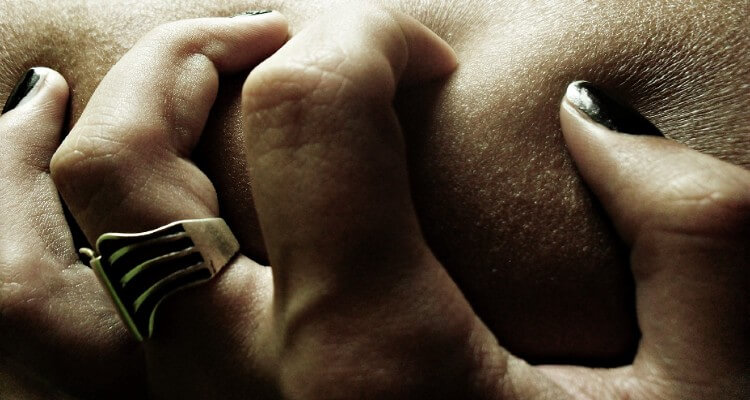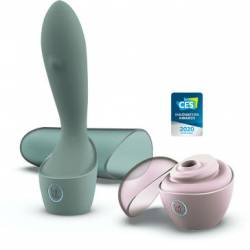Lonely Lovers Are Turning to Sex Dolls to Satisfy Their Pandemic ‘Skin Hunger’
How touch deprivation is fostering acceptance of artificial companions.

“As if 2020 weren’t horrible enough, I’m also losing my wife of nearly a decade—also my high school sweetheart—to ovarian cancer,” begins a letter to the Slate sex advice column, How To Do It, by someone self-identified as End of Life.
The writer explains his wife’s illness has made sex uncomfortable for him to discuss with his life, though much less about his own desires:
Though I was mum about broaching sex for a while as we dealt with the life-and-death situation, I also wanted to make sure she knew I still found her as beautiful and desirable as I always have.
Toward the end of the letter, which I encourage you to read for yourself, End of Life expresses that what he really craves is not sex but basic human contact.
One of the things I enjoy most is just being close and cuddling together in our bed, though this has been more difficult of late because of some of her medical needs.
He confesses to considering the purchase of “one of those realistic sex dolls” as a possible solution, concluding with the heartrending supposition: “at least then I could hold someone, and our bed wouldn’t feel quite so empty. Is that crazy?”
Satisfying ‘skin hunger’
What End of LIfe appears to be suffering from is “skin hunger.”
Also called “touch deprivation,” it’s best described as a psychological longing to engage in physical contact with living things. Or better yet another person.
Though cases of it have definitely skyrocketed during the COVID-19 pandemic, with so many of us isolated under quarantine, it’s far from a newly discovered condition.
Most notably, 1950s psychiatrist Harry Harlow’s experiments with rhesus monkeys, where touch-deprived ones clearly preferred physical contact with a surrogate “soft mother” over a “wire mother” that only provided nourishment, demonstrated how deeply ingrained this need for physical contact can be for every primate—like us.
The need to reach out and touch someone

Because of this innate skin hunger, It shouldn’t come as a surprise that the sexbot industry has seen a dramatic increase in sales.
Even Forbes noted the trend, reporting specifically about Sex Doll Geniue’s particular boost, “The company saw a 51.6% increase in orders from single men in February and March, with a 33.2% year-on-year growth in orders placed by couples in April.”
Unfortunately, this article, along with similar ones, has pretty much been exclusively solely focused on the sexual aspect of sex dolls. Though that is a reasonable assertion, it often doesn’t factor in why others are buying or, like End of Life, seriously considering.
I count myself, of course, as one of them, having written about my personal pro/con debate on the idea for Future of Sex. Just in case you might be interested, I’m still pondering though my own case of skin hunger is steadily pushing me toward the pro side of things.
Real benefits versus perceived drawbacks
Just as foreseeing a boom in sexbot sales, along with other varieties of sex tech hardware, virtual reality adult entertainment, erotic games, and so forth, didn’t require a functioning crystal ball, so to the debate on whether or not sex bots are good or bad for society hasn’t let up.
Among one of the most prevalent arguments against them being that somehow a realistic artificial companion, purchased for sexual pleasure or just someone to hold, has been that they inherently objectify women.
The reason I bring up this one particular point is twofold. The first hinges on considering skin hunger as primordial loneliness, since the need for human touch is far older than even language.
Staying with this, objectified or not, having a lifelike simulacrum of another human being to caress, hug, kiss, or simply share space with could be exactly what many need right now.
‘Dolls don’t objectify people, people do’

The second reason for bringing up that possible impact of sexbots on society is that Rich Juzwiak, who co-hosts Slate’s How To Do It, provided his own rebuttal on that topic in his response to End Of Life’s letter.
After suggesting that it might be better to explore owning one in the future after his wife has passed on, Juzwiak tackles this very same objectification issue.
“I understand your fears about such dolls objectifying women, but dolls don’t objectify people, people do,” he writes. “Sex dolls are rather elaborate toys, and as long as they are viewed as such, they aren’t objectifying women any more than a lifelike dildo is objectifying a penis or your right hand is objectifying your orifice of choice.”
A time for sympathy and support
If you agree with Juzwiak’s reasoning or not, rooted in his answer is what’s more important than the concept of using sexdolls to help stave off the emotional pain of being socially isolated.
It’s instead of chastising someone a lot of pain or condemning his idea based on an unproven theory, he offers sympathy and support.
Because, sexbots or not, it’s as deep a need as skin hunger to know that sexbots or not, despite what we use to cope with the COVID-19 pandemic we’re never alone.
Image source: Verano y mil torment, h3h, TijsB
Leave a reply
You must be logged in to post a comment.

















